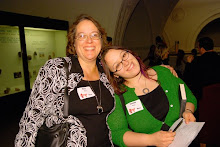On Sunday afternoon I went to mincha/maariv at an Orthodox synagogue in my neighborhood. Last week some random lady there told me that because I sat in the back, instead of next to her, the Kaddish I said didn't count, and later in the week she emailed me to lecture me on "the special structure of Kaddish." Hey thanks, lady. It's not like I work at a Jewish educational website or anything… Anyway, I probably should have taken the hint and never gone back, but some of the other possibilities in my neighborhood don't have a great reputation for always getting a minyan, so this week I was back at the same place, and when I walked into the women's section I was greeted by…big smelly garbage bags. Many big smelly garbage bags taking up the entire section.
There is a metaphor here, and it is not even remotely subtle. Women are trash. Trash belongs where the women usually go. Wow. Thanks.
I was standing in the doorway in shock when a couple of guys showed up to try to figure out what to do with the trash bags so there could be some space for women to daven (I know, novel!). It turned out that the trash bags were full of clothes that had been donated and were going to Israel to families in need, which is nice, I guess, but doesn't really explain why they were taking up the space that had been designated for women. Also, they were smelly.
In the end, the trash bags were pushed to one side and a mechitza was set up within the women's section, to separate us from the smelly trash bags. So, the women's section, which was already less than a quarter the size of the men's section, was suddenly about a third as big as it had been before, which is to say, very small.
When a person dies, we often say of them, "may their memory be for a blessing," or, "of blessed memory." This is the first time that I feel like my mother's memory has really been besmirched. This is the kind of thing that would make her turn over in her grave (so to speak). My mother was a person of utmost tolerance and respect. She was passionate about egalitarianism, but she wouldn't dream of intentionally offending any religious person, and was accommodating to a fault. And here I am, trying to honor her, trying to say Kaddish, and I am grouped with trash bags.
I know that there's a significant difference between bags of trash, and bags of clothing that are going to tzedakah. I appreciate that so many people donated items to go to families in need, but I am frankly irate that the attitude of whoever is in charge of this shul was apparently that the women's section can be used as a storage facility, that it doesn't matter if women have to daven next to huge piles of trash bags, and it doesn't matter if women are davening next to something that smells.
I think observant women need to be making more of a showing at shul, and I think that's the quickest and most effective way of changing the way Orthodoxy views women and feminism, but after my experience on Sunday I can fully understand why women might stay away.



